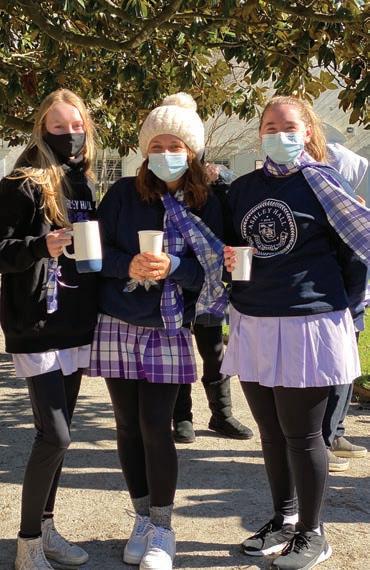
34 minute read
What Matters Most: Moments of Living in Community
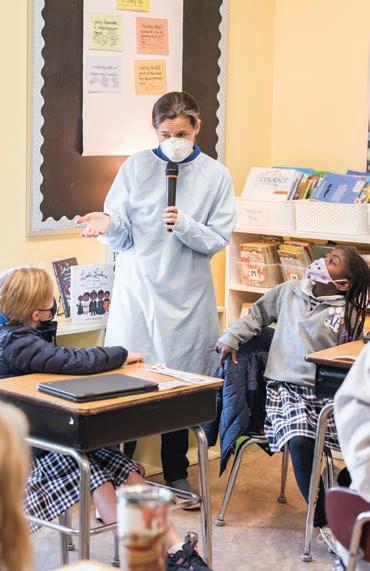
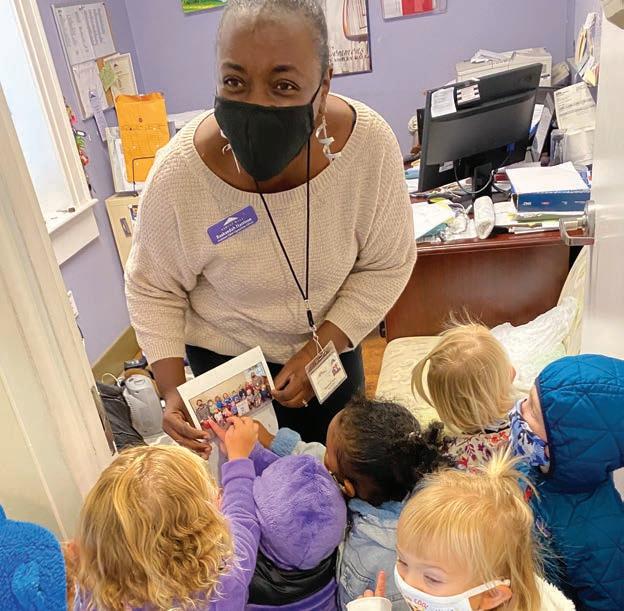
What Matters Most:
MOMENTS OF LIVING IN COMMUNITY
By Jennifer Turner, Editor & Director of Content
Faced with a year filled with considerable challenges, the Ashley Hall community found strength and purpose in supporting one another and seeking new ways to celebrate joy, connection, resilience, and innovation. Even as beloved traditions were adapted in response to the ongoing risks of the pandemic, no modification could alter the underlying significance that what truly matters still ties us together.
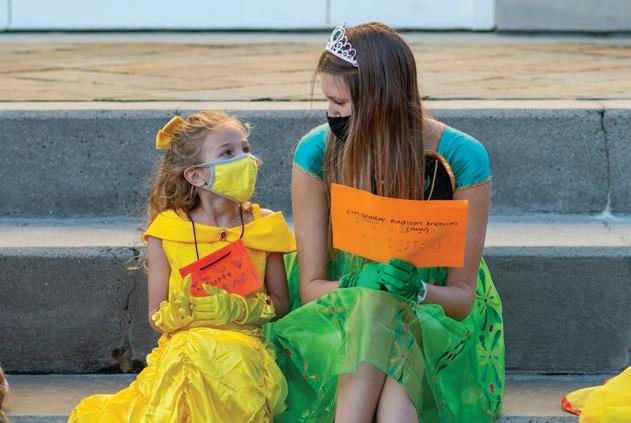
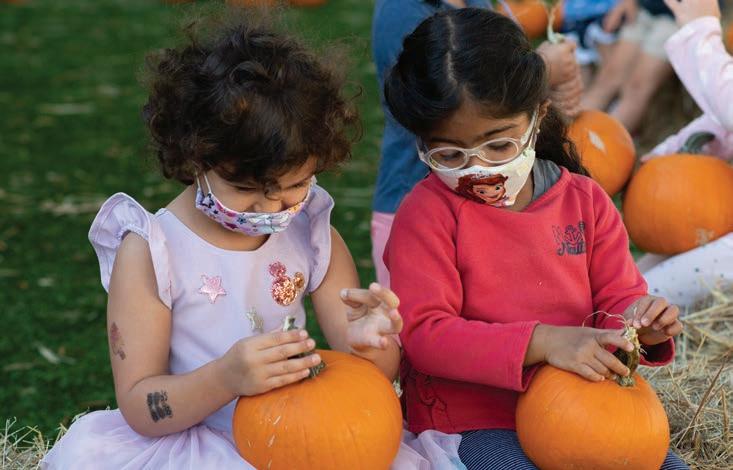
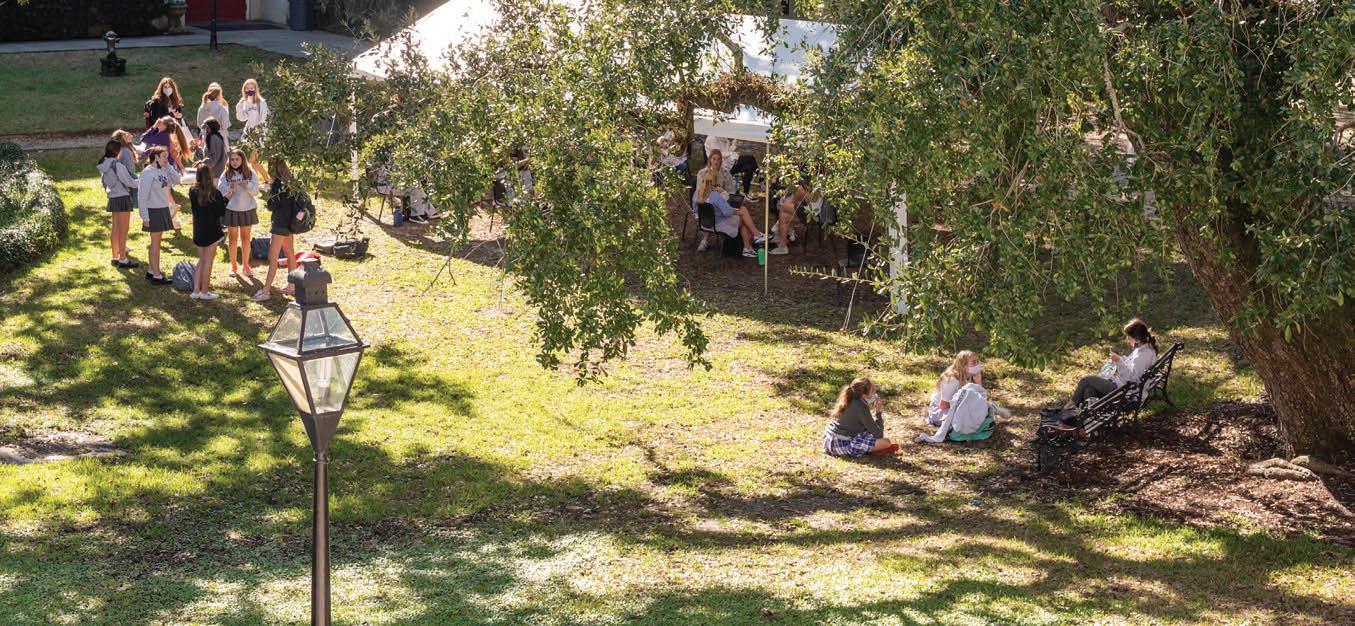
WE ARE Ashley
Hall
IN THE PATCH! This past October, Early Education Center (EEC) students exchanged their annual visit to the local pumpkin patch for a romp in their own backyard! With hay bales, photo props, songs, and games, the eager fall revelers embraced the new location as they undertook the most important task of all: picking the perfect pumpkin to take home.
FEELING RIGHT AT HOME With safety protocols and occupancy limits in place, as well as a newly painted interior, this fall seniors moved into the Shell House, a special gathering place rich with tradition and reserved just for them. COSTUMES, CANDY, AND CAMARADERIE Halloween was the perfect opportunity for some campuswide fun! Younger students paraded in their costumes while older students cheered them on; there was even time for a special Big Sister-Little Sister meetup with outdoor games on the lawn.
GROW WHERE YOU ARE PLANTED This fall, teachers turned their attention to enhancing the hands-on learning opportunities available on campus. To help growing conditions in the first graders’ garden, Lower School faculty member Beth McCarty had the bright idea of using raised beds that can be rolled into the sunlight. “A hands-on garden shows the students where their food comes from and how much time and energy goes into each bite of food they take!” she noted. Having already planted a number of fruits and vegetables, students eagerly anticipate eating from the garden year-round and changing the crops with the seasons. GIFTS FROM THE HEART An Ashley Hall tradition for over twenty years, the Holiday Gift-Giving Project gave students from all divisions a wonderful opportunity to provide holiday presents for members of the local community, including Chicora Elementary School, the Undergarment Society, and The Star Gospel Mission. In early December, students went by grade level to place their gifts either on the stage of Davies Auditorium or under a beautiful Frazier fir in front of the Bear Cave.
SPECIAL DELIVERY In honor of Thanksgiving, students in EEC faculty member Rachael Carter’s pre-primary class crafted special cards to thank their Ashley Hall heroes. Eager to make others happy, the children walked across campus to hand-deliver each one. “There are so many people who brighten our days without knowing what heroes they are for making learning possible,” said Carter. “We are thanking them for working so hard every day so that we can have fun at school!”
| Opposite, clockwise from top, L-R: Upper School students gather during lunch. Photo by Kelly Grace Photography | Rohe Netter and Jana Nadig, Class of 2035, visit the EEC’s pumpkin patch | Kayla Kirkland, Ava Piebenga, and Mallory Mease, Class of 2021, enjoy hot chocolate during the annual senior tree decorating event. Photos by Meredith Frazier | Lower School faculty member Susannah Elliott has fun in French class with Jane Lesemann and Rosalyn Bailey, Class of 2030. Photo by Kelly Grace Photography | Little Sister Charlotte Deupree ’33 enjoys talking with Big Sister Abby Clarke ’21 during a special Halloween meetup. Photo by Meredith Frazier | Pre-primary students surprise Director of Operations Rasheedah Harrison with an Ashley Hall hero card they made themselves. Photo by EEC faculty member Rachael Carter OUR FACULTY Making students their priority, our faculty members have honored seating requirements while still creating a sense of community, spent hours designing inspiring lessons to engage both present and distant students, and helped one another Heroes With their positive energy and spirits shining through masks, aprons, and face shields, the Lower School faculty members have kept their classrooms and curriculum engaging and dynamic, regardless of the Continually working to keep the curriculum innovative, current, and creative, the Intermediate Program (IP) faculty members collaborate to help each girl find her path to become the very best version of herself. IP students develop skills, grow in knowledge, and seek to become life-long learners because of their teachers’ joyful challenges and intriguing questioning. —Mary Schweers, Intermediate Program Coordinator “ “ ” “ ” “ My faculty members have shown an incredible willingness to do whatever is needed to support our School and the development of each student. I am thankful for their positivity and willingness to continually model community, resilience, and adaptability. While their roles may have changed, their hearts and goals have not. —Betsy Quirin, Early Education Center Director COVID-19 restrictions. We are forever grateful for the time, energy, and joy they give our girls during these uncharted times! —Polly Kronsberg, Lower School Director ” experiment with new technology. They have stepped up to every challenge with patience and grace. —Anne Weston, Ph.D., ’73, Assistant Head of School and Upper School Director ” 5
IN A New Light
LIVING HISTORY
For students in Upper School faculty member Chris Frisby’s American History
Through Film class, living through the events of 2020 presented a unique opportunity to document their environment and create their own historical records. “We each chose a topic which encapsulates a current event or theme of 2020 that will have a longlasting effect on us and our community,” said Sarah McLean ’21. “I am currently creating a personal film about COVID-19 and how it has affected daily routines and changed ways of life for people of different backgrounds.” For their twentyminute films, Frisby asked students to carefully consider their focus. “Your statement of purpose should detail how your project will center Ashley Hall, your home community or neighborhood, and yourself in this current historical moment,” he noted. “How do you imagine your film will serve as an artifact of history over time—for example, 30 years from now?” This film project is important because “ young women are able to bring a new perspective of a national crisis to the viewer. —SARAH McLEAN ’21 ”
In addition to choosing the topic they wished to explore and using their own technology to create their films, students were tasked with securing interview subjects. To explore women’s equality issues and how girls’ confidence levels change as they become older, Mary Scott
Brisson ’21 chose to interview twelve
Ashley Hall students, ages six to eighteen. “I am passionate about female empowerment, and Ashley Hall is renowned for its ability to give young females a voice,” she said. “I wanted to illustrate how that voice changes and enlarges through time spent at Ashley Hall.”
For Brisson, it was powerful “ How do you imagine your film will serve as an artifact of history over time—for example, 30 years from now? —UPPER SCHOOL FACULTY MEMBER CHRIS FRISBY ” to listen to the concerns of the girls she interviewed, including her sister,
Elizabeth Brisson ’27. “Her responses were extremely raw; it is tough to hear that at the young age of twelve she and her peers struggle with body image,” asserted Brisson. “I want to reveal the overwhelming amount of pressure put on girls at a young age and how that pressure morphs over time. Ashley Hall does a beautiful job to restore that lost confidence. The seniors I have interviewed are incredibly strong and seem comfortable pinpointing exactly how they feel in a self-assured manner.”
Similarly, McLean gained insight into the experiences of her interviewees as she explored the effects of COVID-19 on Charleston residents. “My film has revealed that every family has different values and approaches toward COVID-19,” she pointed out. “These values should not be forgotten about or scrutinized. Every choice is a personal decision, and though we may want people to be active at school or in the community, it is hard for families to release their loved ones into a seemingly more dangerous world.” McLean chose to interview both high school and college students attending classes, either in person or virtually, as well as teachers, doctors, and college admissions staff. “The most interesting discovery I have made is that many people are suffering emotionally and mentally,” she said. A significant moment for McLean was the revelation by her best friend of the immense daily struggles of learning virtually and missing out on key senior year events. “Though I knew she was struggling without seeing friends, it was enlightening to hear her confide in this film that she often cannot choose what she does because of COVID-19 precautions,” she shared.
Embracing the experience of creating their own documentaries, both Brisson and McLean appreciated Frisby’s guidance. “Our American History Through Film class has been a phenomenal experience, and Mr. Frisby has done an excellent job tailoring the curriculum to the desires of the class” said Brisson. For McLean, the project has helped her realize that her contributions matter to the historical record. “Younger female minds are often not promoted or seen in the cinema, and through these topics and the way we direct our films, our viewers can deduce the truth and feel the emotion we have planned to convey,” she emphasized. “This film project is important because young women are able to bring a new perspective of a national crisis to the viewer.”
| POWERED BY PQV
True LifeTO
In Visual Arts faculty member Raúl Miyar’s Foundations of Art class, students become keenly aware of their environment. Only by learning to refine their skill of observation can they begin to develop as artists. “Figure drawing is a pillar in beginning drawing lessons because of the complexity of the subject,” Miyar noted. “It requires intense focus and observation to attain accurate descriptions of shapes and forms. As one of the most important foundational drawing exercises, it expands the student’s perceptional skills.”
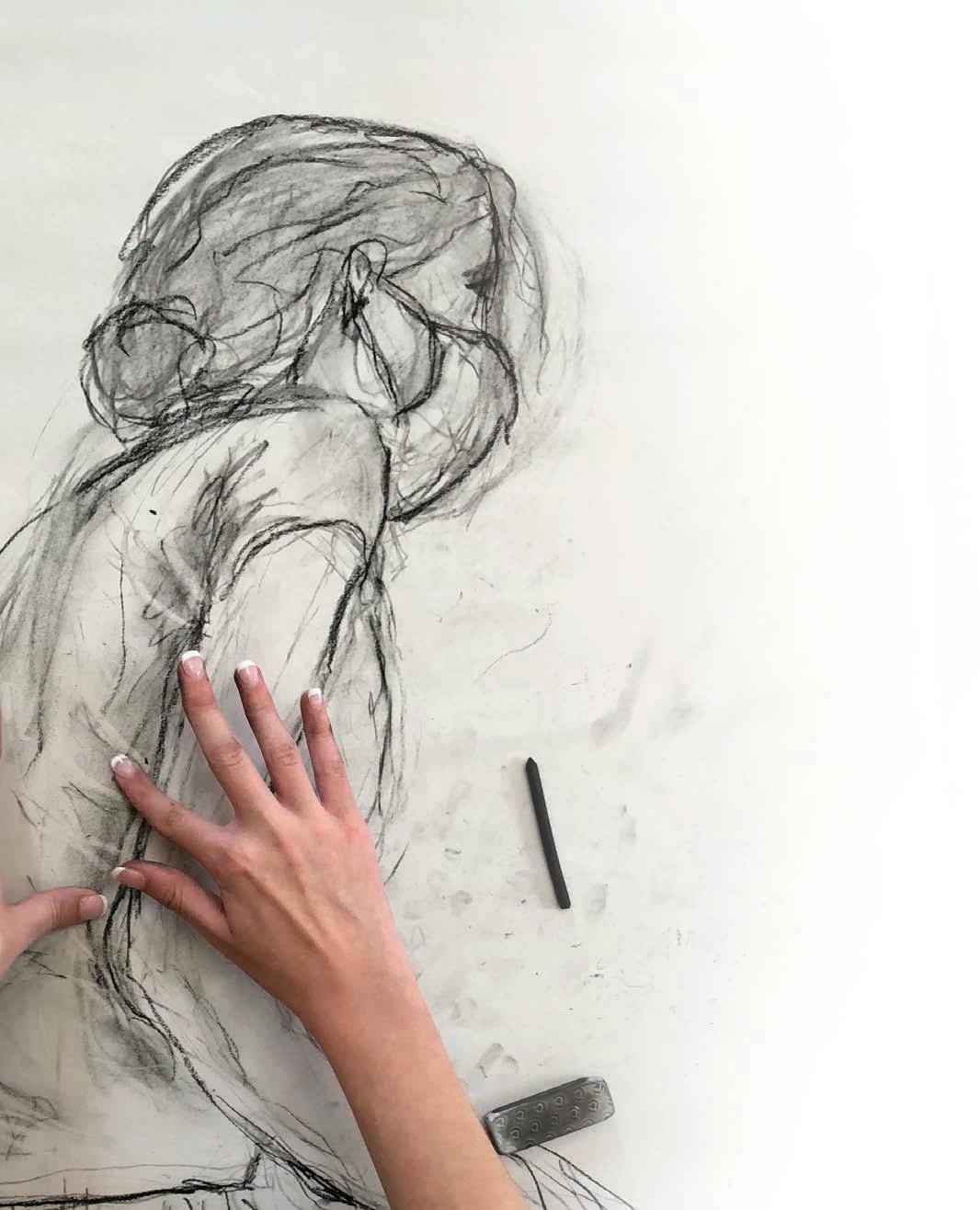
To hone their drawing skills and techniques this semester, students completed a series of figure studies using their peers as models. For Miyar, observing objectively is critical. “At the introduction to the course I explain that they are not learning how to draw but are instead learning how to see,” he said. “Most of them have probably not absorbed this information conceptually at this stage, but in time as they practice their observational skills, they will begin to comprehend the power of visual expression and how they are in control of what they communicate visually. As they develop their skills further, these conceptual ideas will become the basis of their practice, but before they reach that point they need to develop the technical skills that will enable them to communicate their ideas freely and uniquely.”
In their sketches, Miyar’s students capture their classmates in various poses during everyday life. As part of the campus environment, masks appear in many of his students’ compositions and reflect the reality of life during a pandemic. “The emphasis now in their training is technical, but whether the student knows it or not, when observing reality the result is usually compellingly honest and captivating,” Miyar pointed out. “The ordinary, which is normally overlooked, is not transformed; it is simply observed and highlighted. In acquiring the basic technical skills, the student learns to scrutinize that which is usually not noticed, consequently giving it new life and significance. The result is a direct window into each artist’s perception of the world and all the emotions connected to what and how each individual perceives.”
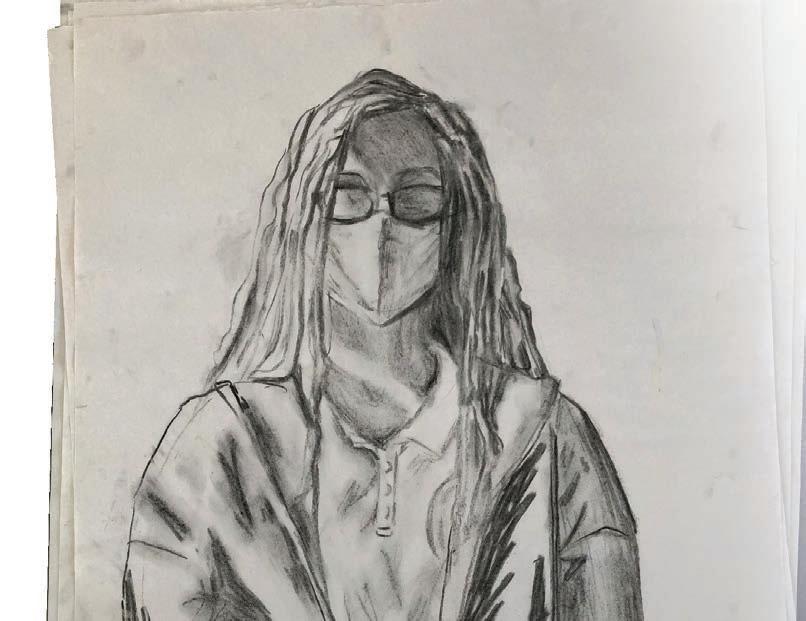
NURTURING Connections
What do you like ?best about the Intermediate Program’s Morning Meeting GOOD MORNING PARDUE HALL! Intermediate Program students run their Morning Meeting through Google As leaders in Pardue Hall, fourth graders take their Meet, with an advisory group responsible responsibilities seriously. In prior years they traditionally ran the weekly Lower School Assembly and took turns planning and presenting the content. However, with assemblies on each week for presenting daily announcements and a daily feature. campus suspended for safety precautions, a new medium of communication was needed. “We felt that it was important to find a way to continue this practice of leadership for our students,” said Lower School faculty member Kendall Lee, who teaches fourth grade, along with Lower School faculty member Allie Jordan. “Having gotten used to using a lot of different media platforms, we discovered it was relatively easy to make the jump to filming a weekly news show that we could disseminate to the rest of the Lower School. Each week, two fourth grade girls interview an Ashley Hall staff member, report the weekend weather, make special announcements, acknowledge birthdays, report on pop tab collections, and note any other additions contributed from outside sources.”
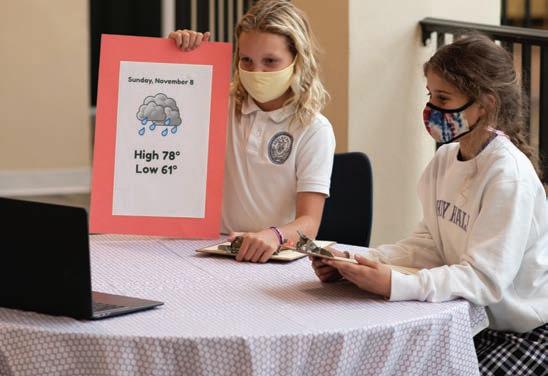
The content is fun and engaging, and fourth graders are eager to help the Lower School stay connected. “It’s nice to be able to practice, rather than being live in front of the entire Lower School,” said Claire Khan ’29. Filming locations have included the Collab Lab and the Bear Cave, and Performing Arts faculty member Kristine Peters pitches in with formatting each week’s presentation. “I like the extras, like the clapping and the singing in the background, that Ms. Peters has added in,” said Virginia Hagood ’29. For Sadie Winters ’29, the joke of the week is her favorite part, “even though they’re kind of silly.” While fourth graders miss the big assemblies of the past, they still appreciate the chance to fulfill their important leadership roles and learn something new. “It’s disappointing that we can’t do it live in Davies Auditorium, but it’s fun getting to film, especially in different locations,” agreed Camille Marler ’29 and Pippa Taylor ’29. That sounds like the perfect outlook to start the day.
| Amelia Lennon and Eliana Grek, Class of 2029, present the weather report while hosting Good Morning Pardue Hall. Photo by Paula Harrell
Morning Cup of
Sometimes, it is the small, normal things that help to start a day off right: hearing class announcements and the lunch menu, celebrating birthdays and athletic team victories, and even having the thrill of being named student of the week. Most of all, the skits, videos, and inside jokes are what everyone eagerly anticipates; somehow, having a reason to laugh makes everything better. A much-loved tradition in the Upper School, Morning Meeting this year transformed to continue fulfilling its purpose: bringing a community together.
“It was important to our student leaders that we continue to gather in some way, and Morning Meeting has always been one of the ways we come together as a full community,” said Dean of Students Kelly Sumner. “Having a virtual Morning Meeting provides us with a common experience that helps us to feel as if we are all together, even if we aren’t in Davies Auditorium as we used to be.”
Most mornings, student body president Mary Scott Brisson ’21 joins other student council leaders to create that unifying force. Broadcast after the first class block of the day, Morning Meeting has fallen onto their willing shoulders. “My goal for Morning Meeting this year is to keep the student body and faculty engaged,” Brisson emphasized. “I want to attempt to preserve the ten minutes of fellowship every morning that we have had for so many years, even if it is over Zoom. I want more underclassmen to be involved!” Liv Hansen ’25 helped answer that call to action by re-establishing the Nautilus Program’s own Morning Meeting. In addition to tuning into the main meeting, once a week she leads her own team and serves as chief promoter of fun. “Having a Nautilus Morning Meeting is important because it makes school fun even through this whole pandemic and reminds us all that we have each other to lean on,” she said. “I look forward to Tuesdays because we get to dance and start our day with positivity, and we get to have our own announcements so everyone knows what is going on for the week. I love to get everyone excited. It gets me in a good mood and awake for the day!”
PQV
Creating an environment where that positivity can shine is crucial, especially for a school that advocates for the benefits of student connection. “The tradition of Morning Meeting is important because it provides a sense of normalcy, but more importantly, it gives the younger girls a platform to gain voice and confidence while forging an even stronger connection among the Nautilus group,” said Assistant Director of Upper School and Director of the Nautilus Program Chris Hughes. As the student leaders fostering those ties, Brisson, Hansen, and their teams have worked hard to be a force of positivity for others. “It is important to preserve the essence of Morning Meeting this year because it is an integral part of the sense of community within our Student Body,” asserted Brisson. Through all the costumes, dance routines, videos, and shared laughter, they are bringing a
school together, ten minutes at a time.
| Marissa Dye, Mary Scott Brisson, and Emma Reuther, Class of 2021, prepare to go live for the Upper School’s Morning Meeting. Photo by Paula Harrell
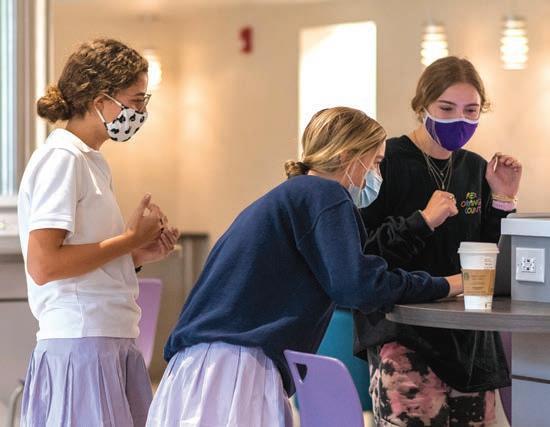
TEACHING Innovations
NOT MISSING A BEAT
This past fall, Performing Arts faculty member Kristine Peters encountered more than the usual challenges of starting a new position; as the teacher of Lower School General Music, the Intermediate Program’s Choral Music, and Caroline’s Carolers, she faced pandemic safety limitations of an important classroom element: singing. “We don’t sing, but we approximate singing by chanting with inflection, and whenever possible, I accompany them on the piano so they can hear melodic shapes and continue their Tuneful development,” said Peters. “We create sound stories, using instruments as sound effects to build the mood.” Having spent a decade studying under master music
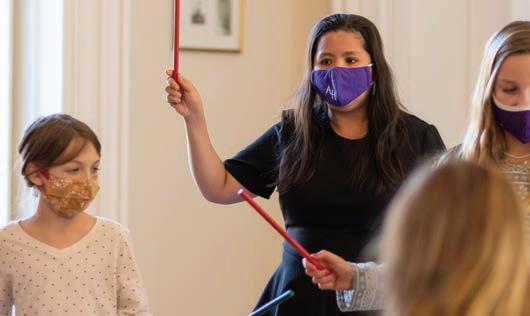
LOVE CONNECTION
Nurturing relationships is a central element in the Early Education Center (EEC), and this school year, faculty members piloted some creative ways to help distance learning students meaningfully connect with their friends on campus. “We love our distance learners and want them to feel included in the classroom setting,” said EEC faculty member Amy Kuenzel. “At circle time each day, we rub our hearts and say the names of any classmates not with us to send them good thoughts. We display their photographs and include their answers on any charts in the classroom and on our display board so that their names are written everywhere, just like their classmates’ names. Many of our children can even identify our distance learners’ names. We want each child to be welcomed back as a familiar face when they return to campus.” Technology helps in maintaining these important connections. “We held a circle time via Zoom with our distance learners and allowed our in-person students to interact with them on the computer,” explained EEC faculty member Batey Self. “The distance learners were able to feel like a part of the classroom, and our in-person students enjoyed sharing activities with them.” In addition to educators to understand how children learn, Peters draws on her extensive training to ensure her classes remain musically rich. Her approach enables students to perform well-known works in new and interesting ways. “A wonderful book like Goin’ on a Bear Hunt is given new life when we add the vibraslap to sound like the slapping of mud, or jingle bells to represent snow,” she noted. “We use movement and body percussion to analyze form and bring meaning to iconic music. The gradual tempo increase of a popular-classical favorite like Grieg’s ‘In the Hall of the Mountain King’ becomes much more satisfying when one is tapping out an intricate routine of pats, snaps, claps, and stomps. With simple melodies as the foundation, we start with a simple rhythm (the steady beat kept on a bass xylophone or a short repeating pattern played on rhythm sticks); from there we layer on melodic fragments as developmentally appropriate and un-pitched percussion to add musical color.” The resulting lessons have inspired students to expand their understanding and appreciation of music. “Whether it’s playing or singing in an ensemble, dancing to music at a wedding, or chanting at a ballgame, when we synchronize in a musical way, we are communicating in a way specific to humans,” Peters affirmed. “We activate an abundance of esprit de corps that honors the heart of the humans around us.”
talking via video chat, students have discovered an old-fashioned way to communicate. “We also send mail to our distance learners!” smiled Self. “We send them notes or drawings from their classmates, materials for activities we are doing in the classroom, and even little surprises and stickers to make them feel special. They also send mail to our classroom, and our in-person students love hearing from their distance learning friends.” Together, they are bridging the distance and proving friendship knows no bounds.
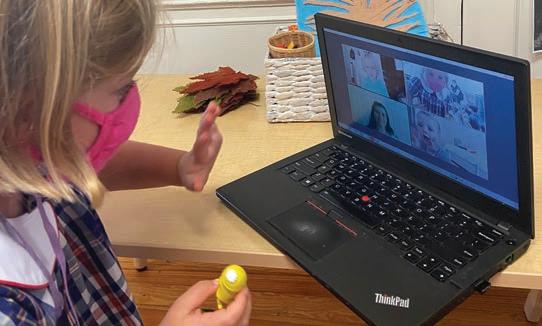
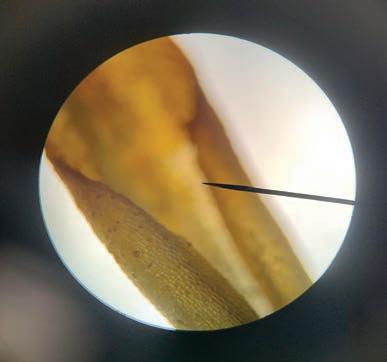
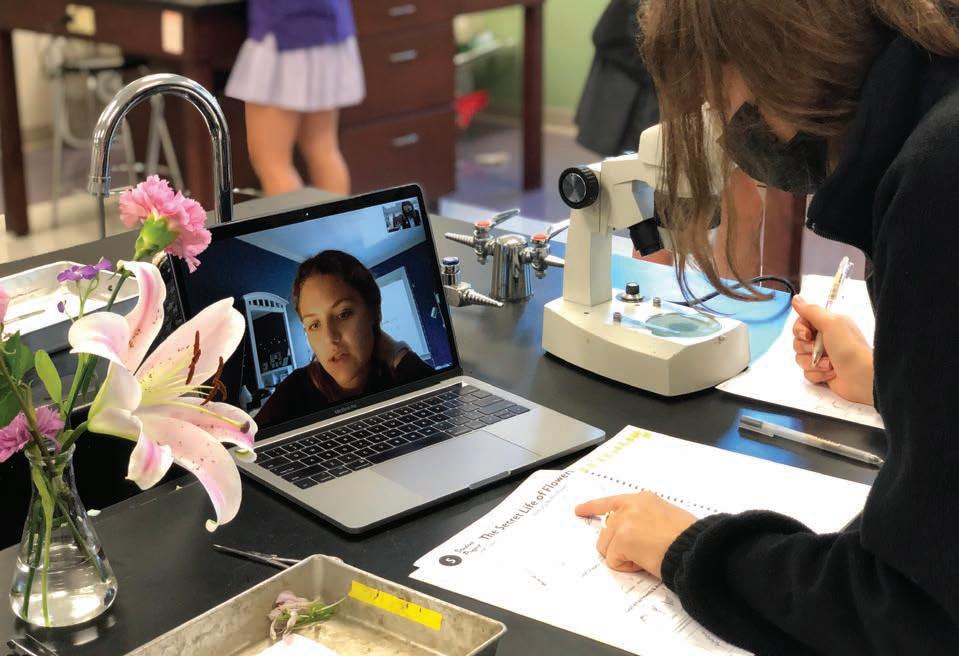
| From Top, L-R: Ava Piebenga and Ruby Sloan, Class of 2021, work together during their Biology II lab. Photo by US faculty member Allison Bowden | An anther with grains of pollen captured through photomicroscopy. Photo by Ruby Sloan ’21 | An underdeveloped anther. Photo by Annie Prochazka ’21 | Opposite, from top, L-R: Sadie Tick ’27 and Performing Arts faculty member Kristine Peters during sixth grade choir practice. Photo by Meredith Frazier | Barbara Bower ’35 says hello to David deHoll ’35 and Blair McDermott ’35 via the computer during a special circle time. Photo by EEC faculty member Charlotte Williams ’10
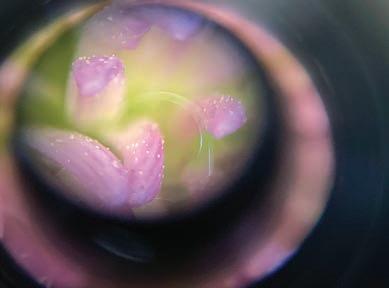
CLOSING THE DISTANCE
In lab-based Honors Biology II, students undertake their own investigations to gain hands-on scientific experience, and Upper School faculty member Allison Bowden finds creative ways to empower her distance learners to fully engage with the class. “I have changed my homework assignments to involve more field work at home, including backyard observations, photos, and collecting of plants,” she noted. “All students can share their findings, whether through the projection of my computer screen or with a show-and-tell in the classroom. I have also developed lessons and activities that can be conducted at home or participated in via online attendance.” Those adaptations have proven invaluable to her distance learners. “Mrs. Bowden includes distance learners in discussions and activities the other girls are doing in person, makes sure we can ask questions while going over notes and homework, and lets us participate in labs and fun experiences,” said Ava Piebenga ’21. “When our class was working with air plants, she sent home two for me to plant as well.” In particular, Bowden wants her distance learners to experience the lab experiments that are an integral part of Honors Biology II. When students began researching the inner workings of flowers, she saw the perfect opportunity to model scientific collaboration. “While conducting the lab, my on-campus students embraced the opportunity to teach their distance-learning partners,” said Bowden. “They carefully followed procedures as they worked to identify the structures together.” Using compound light microscopes and dissecting scopes, students also practiced photomicroscopy to capture intricate photographs of flower anatomy. “Being able to call in and work directly with an in-person partner increased my understanding of the lesson content significantly,” affirmed Mallory Mease ’21. “As a virtual student, I was able to take pictures under the microscope which allowed me to look more closely at the parts of the flowers I had only seen on diagrams up until that point.” According to Bowden, those partnerships are an indispensable component of her students’ educational experience. “I think the on-campus students learned more from the lab by seeing it through their distance partners’ eyes,” she said.
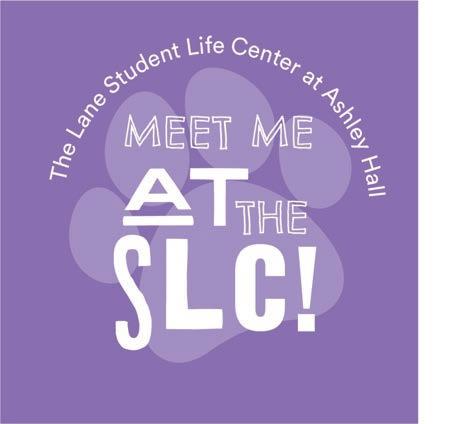
By Jennifer Turner, Editor & Director of Content

When the Lane Student Life Center opened in October, it achieved a long-planned goal of creating a central location for Ashley Hall’s already robust signature programming in wellness, college counseling, and student life. Although limited by the ongoing challenges of the pandemic, the Center quickly exhibited how well the School’s Department of Student Life has continued to fulfill its crucial role of serving students’ needs.
Offering 6,000 square feet of repurposed space for students in ninth through twelfth grades, the Lane Student Life Center (SLC) seeks to meet students’ needs by gathering under one roof critical services and guidance opportunities. “We know that in order for true learning to occur and to have a healthy campus life overall, it is vital to address the mental health and the social-emotional needs of our students,” said Upper School Counselor Katie Neighbours. “Having a space dedicated to these needs prioritizes these important aspects of student life.” The SLC features a wellness classroom, a café, administrative and counseling offices, additional classroom space, and areas designated for collaboration, study, socializing, and movement. Although pandemic health and safety policies have required some of these offerings to be gradually phased in, Upper School students have already come to appreciate the building’s unique purpose.
“This year’s seniors are very intent on spending as much time on campus as possible and have really taken to all areas of the SLC,” said Dean of Students Kelly Sumner. “I think they feel safe and supported as well as valued and heard in this building. They know it is a place where they can have so many needs met as well as a place to just seek solace in the café or with a trusted adult.” In addition to prioritizing opportunities for mentoring and relationship building, the center is also the place where students make plans for their future. “We are better able to help our girls understand that the development of all aspects of their lives will best direct them in their college choices,” said Director of College Counseling Amanda Murrell. “The SLC will encourage conversations that explore how all aspects of our lives are intertwined.” “ I love the study rooms and the ambiance of the first floor. I think it is a mentally happy space for being productive and also spending time with friends. —RUBY SLOAN ’21 ”
| L-R: Sarah Marshall, Kitty Goldman, Ruby Sloan, and Grayson Brewer, Class of 2021, chat over coffee in the SLC. Photo by Meredith Frazier
Members of Ashley Hall’s Department of Student Life recently shared how their work has adapted in response to the many challenges of the pandemic and how they are helping students thrive in a time of stress and anxiety.
Carrie Singh Director of Student Affairs
“Looking back at an old appointment calendar, it was three years ago, almost to the day, that Mrs. Muti and I met with an architect to share a vision for a new student center on campus. With the opening of the Lane Student Life Center (SLC), we are thrilled and grateful to so many to see this vision become a reality for our community. Ashley Hall has long been committed to health and wellness as a core component of the student experience; our wellness programming is founded on the belief that a student’s social-emotional learning is crucial to her ability to advance in her academics, athletics, arts, and career aspirations and to lead a fulfilling life, developing into the person she is meant to be. The design of the SLC was to provide a central place for information, community building, support, and sustenance. This repurposed ‘addition’ to campus includes communal areas, study rooms, multipurpose classrooms, a wellness studio, a dedicated student leadership work space, a small café, and the offices of devoted student support personnel (Dean of Students, Director of College Counseling, Director of Student Affairs, the Upper School Administrative and College Counseling Assistant, and the Upper School Counselor), all intentionally designed to support and positively impact the growth and development of adolescents.
By creating a space that emulates a college campus student union, the SLC will offer opportunities for student independence, self-regulation, and agency, providing instances whereby our girls develop and hone decision-making and time management skills. Our café will utilize a point of sale system linked to the student ID cards of ninth through twelfth graders, helping prepare them for the ‘one card’ system used in many colleges. We visualize time for reflection, relaxation, and mindfulness with yoga, meditation, or exercise in a multipurpose wellness studio and chances to commune with friends and classmates in the banquette style seating or the standing desk computer charging stations in the SLC’s commons area. Ultimately, our hope is that this space fosters a sense of belonging for our students, allows them to feel both cared for and independent, and gives them the tools they need to flourish and become the best version of themselves. We believe every student

can discover ways to find the professional or peer support she needs for selfknowledge and self-care. Through this kind of agency, she also learns how to be accountable for her decisions and how to practice the critical skills she needs to cultivate inner strength and resilience.
The vision for this renovated space was conceived before the arrival of a global pandemic. Despite our thoughtful design process, we did not anticipate what protocols a pandemic would require.
We are making necessary adjustments to ensure the building can be used both purposefully and safely, while still honoring its intended users: our students!
Perhaps now, even more than ever before, the health and wellness of our students are of utmost importance, and the literal and figurative space to allow them to practice the skills needed in today’s world in the safe and supportive environment of the SLC will be a most welcome and compelling addition to our campus.” 3 WAYS THE LANE STUDENT LIFE CENTER WILL HELP STUDENTS Thrive
I think the café is going to be a big hit with the students. I love the open design of the commons area, which will encourage collaboration and fellowship, and I am excited that our student leadership will have their own space for the first time.
Having the Upper School Counselor, College Counselor, Dean of Students, and Director of Student Affairs all in one building together will give the students the most support possible. The reason we all get into education is to spend time with students, to support their growth and development, and to learn from them along the way. This building is just an avenue toward making that possible.
As the only independent girls’ school in South Carolina, we know that a singlegender school provides more leadership opportunities and an environment of female mentoring that cultivates confidence. This space will certainly enhance that.
10 WAYS TO MAINTAIN Calm WHEN APPLYING TO COLLEGE DURING A PANDEMIC
The internet can be your friend. Use online resources, such as tours and webinars, as much as possible.
Amanda Murrell Director of College Counseling

“We miss having students sitting on the couch in our office and chatting. However, in terms of working individually with students, thanks to the wonders of technology, little has changed. My days are filled with Google Docs and Zoom meetings, but I can see the girls without masks when we meet, so that’s a plus for me! All our college visits also have been virtual this year, but we have been the beneficiary of some visits that we wouldn’t have had in the past because of travel limitations. We’ve had representatives from international schools schedule visits, as well as a greater number reaching out from schools in California.
The greatest challenge for me is that many of our seniors have not been able to visit a lot of college campuses. Virtual tours and conversations with college representatives are useful, but our students are accustomed to being able to travel to see campuses in person. The silver lining is that the girls seem to be willing to look at schools that wouldn’t have been on their radar otherwise. They are attending virtual open houses and other online programming and learning about colleges that appeal for all of the right reasons, whether it is the mission of the school or academic opportunities.
The new building is a wonderful gathering place for everything student-related. Having Student Life and College Counseling under the same roof makes great sense because our worlds overlap so much. I look forward to having the café open and enjoying some time with our students in a relaxed, collegial atmosphere.” Use who you know. Reach out to family, friends, and Ashley Hall alumnae to talk about their specific college experiences.
Applying isn’t attending. Apply to a broad range of schools. They might all appeal for different reasons, but that’s ok early in the decision-making period.
Only consider Early Decision if you really want a school. Don’t let panic drive your choice. If you need to wait, wait. The right school will be there for you.
Remember that your parents want to help. All suggestions and offers of help are made out of love and concern. Don’t forget that.
Show discretion. You don’t need to share every detail of your application search with your friends.
Beware of unsolicited advice. See above. Remember that not everyone you meet is an expert on a particular college or on getting into college.
Trust yourself. You know what matters to you. Listen carefully to that voice when you are choosing the schools on your list and when you are applying.
Don’t obsess about college. It can be hard not to, but the year moves quickly, and there are lots of high school things you will be doing for the last time. Remember that.
Reward yourself. Reaching the senior year of high school and applying to college are big events, regardless of the college decisions you receive. You deserve recognition for everything you have already accomplished. Well done!
Katie Neighbours Upper School Counselor
“Creating for students a ‘hub’ dedicated to meeting their (mostly non-academic) needs helps demonstrate both to students and our greater community how much we value these needs and the subsequent services provided to meet those needs. Ashley Hall is more than just a school; it is a community comprised of individuals who genuinely care about students and want them to be the most healthy and happiest versions of themselves. We are already doing so much to address the social-emotional needs of students through our ongoing Wellness programs and initiatives, and the creation of the SLC is simply a demonstration of that priority.

The consistent and continual care for students’ mental health and emotional well-being is always a priority, even more so during the pandemic. I’m not necessarily doing anything differently, other than making sure that even our distance learners know that they can continue to access mental health support even though they are not here on campus. I check-in with students via email and conduct counseling sessions via phone or video conference.
I think one of my biggest challenges has been finding ways to keep students, particularly our senior class, motivated and positive. It is normal and understandable for them to focus on the things that they are missing out on or traditions that they have been looking forward to that are now being reimagined or done differently. I want to help them reframe their disappointment and find the silver linings, but it is challenging. I think the mentality of ‘we’re all in this together’ is helpful; I seek to be an empathetic listener while also encouraging them to lean into their roles as student leaders on this campus. Regarding silver linings and innovations: I believe this pandemic has forced all of us to reexamine our priorities and values. I know that personally, I have changed some of my focus and have rethought about what really matters to me, both personally and professionally. We also have had to become more creative in terms of our campus traditions and ‘how’ we do things. If we keep our focus on the joy that comes from being together in person as a community, we are reminded that we are resilient and can overcome any obstacle.” 4 WAYS TO Support TENSE, STRESSED, OR ANXIOUS TEENS
Validate emotional experiences. Parents and other adults tend to want to problem solve as much as possible for their child; however, sometimes teens simply want an empathetic listener. Actively listening (listening to understand versus waiting for your turn to talk) and helping teens identify their emotions, while also validating those emotional experiences, can be incredibly effective in calming intense feelings while allowing teens to feel heard and understood.
During this time of many unknowns and uncertainties, providing clear communication
is helpful. Communicate with your teen as much as you can regarding upcoming events and expectations. Get their input and give choices when possible. If you really don’t know something, it’s ok to say that too. Talk through the emotions that can bubble up in uncertain, stressful, or nerve-wracking situations.
It’s fairly common for teens to lash out when they
are tense or stressed. Parents and caregivers can often be the recipients of intense emotions. When your teen is upset or if you can feel your own emotions rising, give yourself and your child permission to walk away. Taking a break and coming back to finish the conversation when the emotional intensity has decreased can lead to fewer conflicts.
Practice gratitude. It can become easy to focus on the negatives. If possible, try to actively identify three positive things every day!
Kelly Sumner Dean of Students

6
WAYS ASHLEY HALL UPPER SCHOOL STUDENTS ARE STAYING Connected
MORNING MEETING: Broadcast three times a week at the end of the first block class, it offers students a chance to learn news from their division and share in some community fun.
“This year is especially challenging—as we knew it would be—and the SLC is meeting the need to provide an extra layer of comfort and care to our students. All of our students are still processing the abrupt ending of school last spring, the loss of a summer as they would have experienced it, the daily challenges of mask wearing and social distancing, and the constant worry about what the rest of the year will look like. The SLC already feels like a ‘check in’ spot—not just for business but for yourself—a place to relax a bit, unwind, and meet with the adults on campus who are helping to guide you, support you, and cheer you on.
Our current challenges are gatherings, togetherness, and space. We are supporting students by helping them to reframe their expectations and find the beauty and the joy in getting to do things traditionally, but with a twist. We have had to reimagine what we do but are committed to capturing everything in a way that still honors the spirit of the event. It is easy to get caught up in something ‘not being the same’ just because it looks different, but it can still feel the same and have the same end result, maybe even a better one!
A silver lining is realizing a true appreciation for the opportunity to be together in community; students are gaining the ability to appreciate both what they have lost as well as what they still have in a way that wouldn’t have been possible without these restrictions. Daily conversations are happening in the SLC about triumphs, struggles, plans, ideas, worries, fears, and hopes. Questions are answered, tears are shed, complaints are heard, news is shared, excitement is expressed, and visions are co-created.” TRADITIONS: We have been able to honor several cherished traditions in new ways, including tie-dying masks for Senior/Freshman week, Big Sister-Little Sister outdoor meetups, and seniors enjoying the Shell House, physically distanced of course.
HOLIDAY CELEBRATIONS: Holidays have always been a way to bring the Ashley Hall community together, and we created new ways to celebrate, including socially distanced Halloween parades, a broadcast of the Thanksgiving Assembly, and an outdoor tree for the Gift Giving Assembly to donate gifts for those in need.
ASSEMBLY PERIODS AND ADVISORY MEETINGS:
Students gather with their advisor and advisory group once a week to participate in Assembly and twice a month to eat lunch together.
COMMUNITY ACTION: Students still serve others throughout the year, but we have redefined guidelines during the pandemic to help students find ways to support non-profit organizations within the parameters of our Panther Pledge.
GRADE LEVEL MEETINGS: Eating together as a grade once a month, students meet in Davies Auditorium and often listen to music or play trivia to happily pass the time. This creates opportunities for students to develop new friendships.










